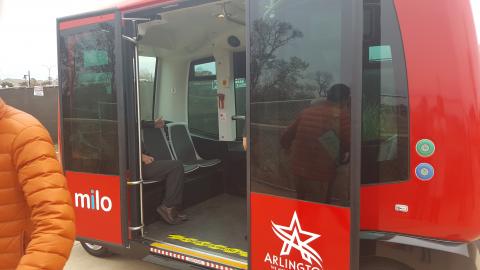METRO’s Autonomous Vehicle Pilot Begins this Summer
Published May 13, 2019 by Tess Cook
Buckle up, Space City, because more driver-less vehicles will hit the Houston streets this summer.
METRO, in partnership with Texas Southern University (TSU), will begin Phase 1 of their first autonomous vehicle (AV) pilot this June. A self-driving car, also known as an autonomous car or driverless car, is a vehicle that is capable of sensing its environment and moving with little or no human input.
After three years of developing a plan and obtaining a national designation to conduct the pilot, the Easy Mile EZ 10 Gen-1 vehicle will begin running the “University Circulator” path during the upcoming summer semester at TSU. The route intentionally takes advantage of lighter foot traffic and the ability to operate a slow vehicle down the university promenade known as “Tiger Walk.”
The EZ 10 seats six persons with standing room for six more people in it. The vehicles have been operating in Arlington, TX outside of AT&T stadium and a senior-living community in Florida.
Although the shuttle will drive itself, a trained operator will be on board at all times to monitor it. The rides will be free, but students will have to swipe their METRO Q-card for documentation purposes, in addition to a signing a waiver before hopping aboard the self-driving car.
According to METRO’s Chief Innovation Officer, Kimberly Williams, “A 2017 statute approved the operation of autonomous vehicles on Texas roads without a driver. This pilot puts us on the path of testing the technology in a mixed-use traffic environment. We are starting first with a limited, on campus route for phase one. The next phase includes plans to extend the route to a nearby rail station so we can explore its capabilities as a first/ last mile connection.” Williams, a Detroit native borne into a transportation family has led the efforts of pilot program.
If successful, METRO will request an extension of the pilot through the fall semester. If Phase 1 is successful, Phase 2 of the pilot would require third-party funding, and extend the self-driving path to surrounding streets of the purple line, and hopefully connect to the TMC3 campus.
The working group to develop this three-year plan included the City of Houston, TXDoT, and Houston Galveston Area Council. The autonomous vehicle was delivered on a container to the Port of Houston in early May, and METRO is now assembling the car and applying branding.
In case you missed it, Kroger began delivering groceries in via self driving cars in the Houston area back in March.
 The Houston Report
The Houston Report



















